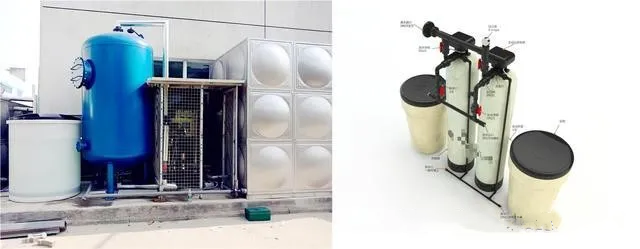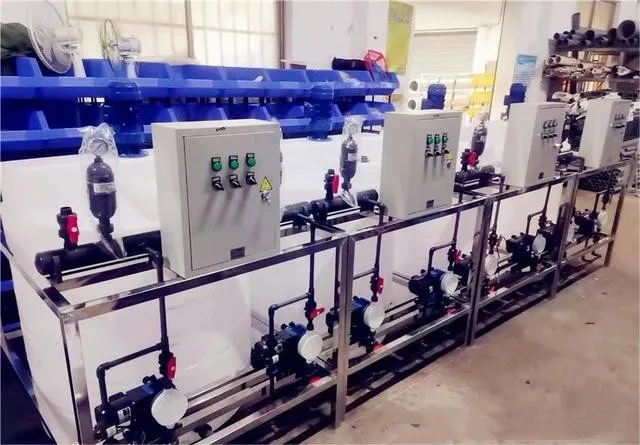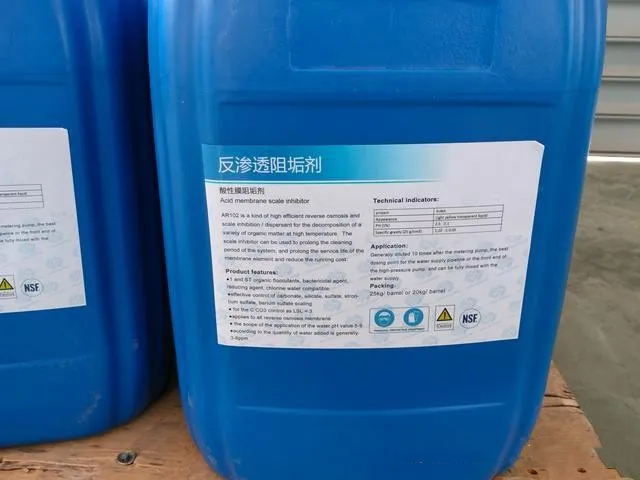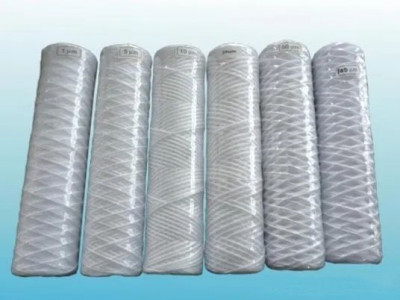In the reverse osmosis (RO) process as the core of the pure water treatment system, resin water softener and antiscalant dosing system are two common pretreatment processes. Both have their own advantages and disadvantages, respectively, for different application scenarios. This article will be from the definition of equipment, process principles, equipment and operating costs and other perspectives for a detailed comparison, in order to better understand the process, and make a reasonable choice in practical applications.
June 5, 2024

Equipment Definition
1. water softener (ion exchange/resin softening water softener)
Automatic water softener is a kind of ion exchange water softener with fully automatic control of operation and regeneration process. Its working principle is to use sodium-type cation exchange resin to remove calcium and magnesium ions in the water, thus reducing the hardness of raw water and achieving the purpose of softening hard water. This way can effectively avoid carbonate scaling phenomenon in pipes, containers and boilers. Water softener has been widely used in various steam boilers, hot water boilers, heat exchangers, steam condensers, air-conditioners, direct-fired engines and other equipment and systems of the circulating make-up water, as well as living water treatment, food, electroplating, pharmaceutical, chemical, printing and dyeing, textile, electronics and other industrial water treatment.
2. Antiscalant dosing system
Antiscalant dosing system is a kind of equipment used for dosing industrial production water, its role is to prevent the minerals and impurities in the water gathered in the pipeline to form scale, so as to extend the service life of the pipeline and improve the efficiency of industrial production. The device is mainly composed of dosing pump, dosing tank, dosing pipeline and dosing pump control cabinet, which is controlled by PLC. The principle is to prevent the formation of scale by adding scale inhibitor to the pipeline, so that it reacts with the minerals and other impurities in the water to generate substances that are not easy to scale.
The Principle of the Process
1. Resin water softener principle
Resin water softener process is through the ion exchange resin in the raw water of the high value of calcium ions (Ca ² ⁺) and magnesium ions (Mg ² ⁺) replacement for sodium ions (Na ⁺), to prevent the saturation of insoluble salts precipitation (scaling). Ion exchange resins are insoluble polymer compounds consisting of an exchange group containing an acidic functional group and a spatial reticulation matrix. The exchange reaction of sodium-type cation exchange resin is as follows:
In which sodium ions are exchanged equimolarly with calcium and magnesium ions, the overall salt content of the water rises during the softening process.
2. antiscalant dosing system working principle
antiscalant dosing system prevent scaling by preventing the formation and growth of mineral salt crystals. Its main mechanisms include:
Chelating and solubilizing effect: Scale inhibitor complexes with high-valent metal ions in water (such as calcium, magnesium, etc.) to form stable water-soluble chelates, reducing the concentration of scale ions.
Lattice distortion: scale inhibitor molecules adsorbed on the crystal growth point, interfere with the normal growth of crystals, resulting in lattice distortion, so that the crystal is not stable, to prevent microcrystalline deposition of scale.
Adsorption and dispersion: scale inhibitor adsorbed on colloidal particles and microcrystalline particles, forming a new double electric layer, so that the surface of the particles charged, thus stabilizing the dispersion in the water.

The Resin Water Softener and Antiscalant Dosing System Parameters Comparison
- Resin water softenerprocess parameters
Exchange flow rate: usually in the range of 20-30 m/h.
Vessel diameter: calculated according to the system water production.
Resin exchange capacity: the full exchange capacity of domestic 001*7 resin is 2.0 mol/L, and the working exchange capacity is 1.88 mol/kg.
Cycle water production: calculated according to resin loading and raw water hardness.
Softened water production index: water hardness can be reduced to less than 0.03 mol/L by one or two-stage softening.
- antiscalant dosing system parameters
Scale inhibitor dosage: Typical dosage is 2-6 ppm, tap water is usually 3 ppm, and 5 ppm when the water quality is poor.
antiscalant dosing system point setting: usually located in the RO feed water before the security filter to ensure adequate mixing.
Effectiveness of scale inhibitor: It is effective for common inorganic insoluble salts such as CaCO3, CaSO4, SiO2, etc.
Comparison of Equipment and Operation Cost
1. Water softener
Initial investment: the equipment cost of water softener is relatively considerable, but with the increase in the size of the system, the unit cost of water treatment tends to diminish.
Operation and maintenance: the replacement and regeneration of resin requires chemical reagents (such as sodium chloride), the annual loss of filter media costs.
Service life: water softener life is generally longer, but depends on the quality of resin and maintenance.
2. antiscalant dosing system
Initial investment: the initial investment of antiscalant dosing system is lower than that of water softener, and the equipment is simple and easy to install.
Operation and maintenance: the purchase and use of scale inhibitor is the main source of cost, according to the process demand for regular dosing.
Service life: the equipment itself has a long service life, focusing on the management of scale inhibitors and the maintenance of the dosing system

Use of the Scene and Choice of Recommendations
1. Scenarios for water softeners
Suitable for large-scale and long-term softening of hard water, such as steam boilers, heat exchangers, pharmaceuticals, food processing and other industrial uses.
It needs to require high quality of incoming water and have enough space and maintenance personnel for resin regeneration and replacement.
2. antiscalant dosing system
antiscalant dosing system is suitable for the scenarios that need to prevent the formation of scale but do not need to remove the hardness of the water, such as reverse osmosis system pre-treatment, cooling water circulation system.
The investment and space constraints are large, and easy operation and low operating costs are required.
Resin water softener and antiscalant dosing system in the water treatment system have their own merits, both in the pretreatment process respectively play an important role. Choosing the right process according to the actual needs can better achieve the effect of water treatment.
Resin water softener is suitable for high hardness, the need for large-scale softening scenarios, but need to consider the high initial investment and maintenance costs.
antiscalant dosing system is suitable for scenarios with clear anti-scaling needs and sensitivity to operating costs, with significant advantages in flexibility and low investment.
As a professional water treatment equipment manufacturer, we are committed to providing the best quality solutions according to the specific needs of our customers. Whether it’s a resin softening system or a antiscalant dosing system, we have the experience and proven technology to support your water treatment project. Feel free to contact us, we will provide you with the most professional service and advice.
Detailed Operating Instructions for Automatic Dosing Systems
December 26, 2024
Characteristics and Applications of Precision Filters
December 19, 2024



